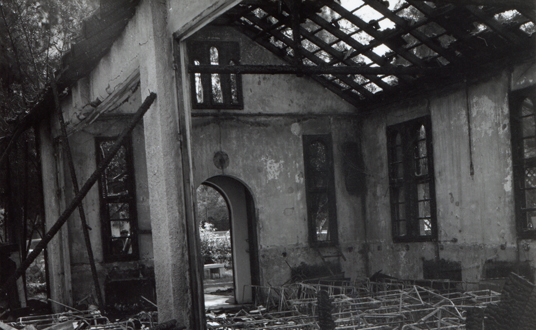By GARY ALLEY
June 2015
Recently, two famous churches on two different continents were attacked within hours, or possibly even minutes, of each other. One attack was against the Emanuel African Methodist Episcopal Church in Charleston, South Carolina, a historic African American church. On Wednesday evening, June 17th, Dylann Roof entered the church joining a Bible study for about an hour before opening fire around 9 p.m. killing nine people. The group was studying the Parable of the Sower (Mark 4:16-20). Allegedly, Roof’s bloody assault on the African American church was to instigate a race war against black people. Roof was captured shortly after and is awaiting trial.

Seven time zones ahead in Israel, around the same time, on June 18th, early Thursday morning, the Church of the Multiplication of the Loaves and Fishes (Tabgha) on the Sea of Galilee, was torched by arsonists. No one was injured, but the well-known and prolific “Price Tag”[1]assailants left menacing Hebrew graffiti from Jewish liturgy sprayed on the church wall, proclaiming “false idols[2] will be eliminated”. This was the 43rd arson attack by the Price Tag group against Christian or Muslim property in Israel over the last six years.[3] Not one suspect has ever been prosecuted.
While the two attacks had starkly different results—the Emmanuel rampage claimed nine human souls and the Galilee church violence only damaged and defaced the church structure, both attacks were birthed by the same vicious spirit—hatred for others. Just like the German Jewish poet, Heinrich Heine, surmised in 1823, “where they burn books, they will end in burning humans,” a burning church in Israel is an unwelcome reminder of the burning synagogues in Hitler’s Germany and the resulting Holocaust. Today, ISIS is almost an obsene caricature of this hatred for humanity as they infamously destroy both culture and civilization, as well as delight in the torture and annihilation of others.
Another similarity between the two church attacks, was both occurred in democratic, Western societies which, theoretically, have laws in place to protect all of their citizens, minorities included. Yet in both attacks, these two free societies, at times, can display a significant disparity between how minorities and the majority citizens are treated on a practical, daily basis. Laws have no teeth unless they are enforced. Justice has no meaning unless lawbreakers and instigators are punished. Hate must be neutralized.
We all know that racism, prejudice, and religious intolerance cannot be completely eradicated by laws, force, or education. Hate comes from a person’s heart and often lurks just below every society’s façade. Hate is a hard habit to break.
How do we followers of Jesus respond to these attacks of hate? Obviously, we are to love everyone, but how do we practically love “haters,” those who envision our destruction? —not easily, and with much wisdom and caution. “Behold, I am sending you out as sheep in the midst of wolves, so be wise as serpents and innocent as doves. (Mt 10:16).”
We are part of God’s Kingdom—wherever we live, walk, work, and breathe, our very presence proclaims that God is alive and in control. In the shadow of His expanding rule, the kingdoms of this world appear faint and fading. Wherever there is darkness, we shine light. Wherever there is death and destruction, we offer hope. And wherever there is hate, we bring a subversive alternative. As evil continues to mutate in different and perverse ways, we confront and challenge hate with redemptive and creative responses. In God’s Kingdom the meek are not martyrs, and the weak are not doormats. Rather, they are prophets of justice and a priesthood of forgiveness. So too, let us find a way to balance our response to hate, today, with both those facets of love.
[1] "Right-wing Jewish extremists have in the past carried out numerous arson and graffiti attacks against Christian sites, as well as against Arab property in the West Bank and Jerusalem, under the “price tag” slogan. The term “price tag” is used by Jewish extremists to describe vandalism or attacks typically carried out against non-Jews or their property, ostensibly as retribution for Palestinian attacks or Israeli government actions deemed contrary to settler interests. Israeli officials have vowed to crack down on the phenomenon, though critics accuse security forces of dragging their feet on prosecuting Jewish suspects." Source, Times of Israel. Last night (June 29th), the Max Rayne Hand-to-Hand school, a Hebrew and Arabic language school in southern Jerusalem where Danny and Eva Kopp's sons attend, was attacked for the the second time in eight months. Spray-painted swastikas and anti-Arab graffiti was left on the school’s walls just in time for the last day of school.
[2] This phrase can be read as a euphemism for Christianity. The whole liturgical phrase: “ha’elilim karot yikaretoon” האלילים כרות יכרתון comes from the Jewish prayer, Aleinu (עלינו לשבח), and is said three times a day and, notably, at Rosh haShanah.
[3] See Chairman Rev. Charles Kopp’s Evangelical Alliance of Israel’s letter below.
![]()
